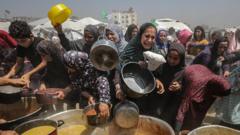**A UN assessment reveals that the ongoing blockade and military operations have exacerbated food security issues in Gaza, putting millions at risk.**
**Gaza Faces Dire Famine Threat as Humanitarian Blockade Intensifies**

**Gaza Faces Dire Famine Threat as Humanitarian Blockade Intensifies**
**UN Report Indicates 2.1 Million in Gaza at Critical Risk of Food Insecurity and Famine**
As the humanitarian situation in Gaza deteriorates, a UN-backed report has warned that the entire population of approximately 2.1 million Palestinians is at critical risk of famine. This dire assessment comes amid ongoing blockades and military operations, which have severely restricted access to essential food and medical supplies.
The Integrated Food Security Phase Classification (IPC) released its findings indicating that the humanitarian crisis has significantly worsened since October 2024, with 244,000 individuals currently experiencing "catastrophic" levels of food insecurity. Despite a brief reprieve during a two-month ceasefire between Israel and Hamas, renewed conflicts and an indefinite blockade on aid deliveries since early March have sharply reversed any previous improvements.
Reports show that around half a million residents—nearly 25% of Gaza's population—are facing starvation, with the IPC projecting that nearly 71,000 children under five will suffer acute malnutrition in the coming months. "Many households are resorting to extreme measures to survive," the report stated, highlighting practices such as begging or scavenging for food.
Israeli military operations, which resumed mid-March, have reportedly confined food and aid access for nearly three months under the pretext of pressuring Hamas to release remaining hostages. This blockade has drawn significant international condemnation, with humanitarian organizations asserting that it could constitute a war crime due to the impact on food security.
The IPC, a collaborative international effort involving UN agencies and aid groups, warns that urgent action is necessary to prevent the looming famine, as the situation has reached some of the highest levels of acute food insecurity on record. The report underscores that a staggering 93% of Gaza's population is encountering high levels of food insecurity.
Despite the humanitarian crisis, Israeli officials have denied the existence of a hunger crisis, citing the volume of aid delivered during the recent ceasefire. The situation remains complicated by ongoing tensions, including reports that Hamas plans to release an Israeli-American hostage in hopes of negotiating a new ceasefire and facilitating humanitarian aid access.
In a context where over 52,000 lives have been lost due to the ongoing military operations, according to data from the Hamas-controlled health ministry, the prospect of adequate aid distribution remains bleak, with many struggling to survive amid critical shortages.
The Integrated Food Security Phase Classification (IPC) released its findings indicating that the humanitarian crisis has significantly worsened since October 2024, with 244,000 individuals currently experiencing "catastrophic" levels of food insecurity. Despite a brief reprieve during a two-month ceasefire between Israel and Hamas, renewed conflicts and an indefinite blockade on aid deliveries since early March have sharply reversed any previous improvements.
Reports show that around half a million residents—nearly 25% of Gaza's population—are facing starvation, with the IPC projecting that nearly 71,000 children under five will suffer acute malnutrition in the coming months. "Many households are resorting to extreme measures to survive," the report stated, highlighting practices such as begging or scavenging for food.
Israeli military operations, which resumed mid-March, have reportedly confined food and aid access for nearly three months under the pretext of pressuring Hamas to release remaining hostages. This blockade has drawn significant international condemnation, with humanitarian organizations asserting that it could constitute a war crime due to the impact on food security.
The IPC, a collaborative international effort involving UN agencies and aid groups, warns that urgent action is necessary to prevent the looming famine, as the situation has reached some of the highest levels of acute food insecurity on record. The report underscores that a staggering 93% of Gaza's population is encountering high levels of food insecurity.
Despite the humanitarian crisis, Israeli officials have denied the existence of a hunger crisis, citing the volume of aid delivered during the recent ceasefire. The situation remains complicated by ongoing tensions, including reports that Hamas plans to release an Israeli-American hostage in hopes of negotiating a new ceasefire and facilitating humanitarian aid access.
In a context where over 52,000 lives have been lost due to the ongoing military operations, according to data from the Hamas-controlled health ministry, the prospect of adequate aid distribution remains bleak, with many struggling to survive amid critical shortages.





















